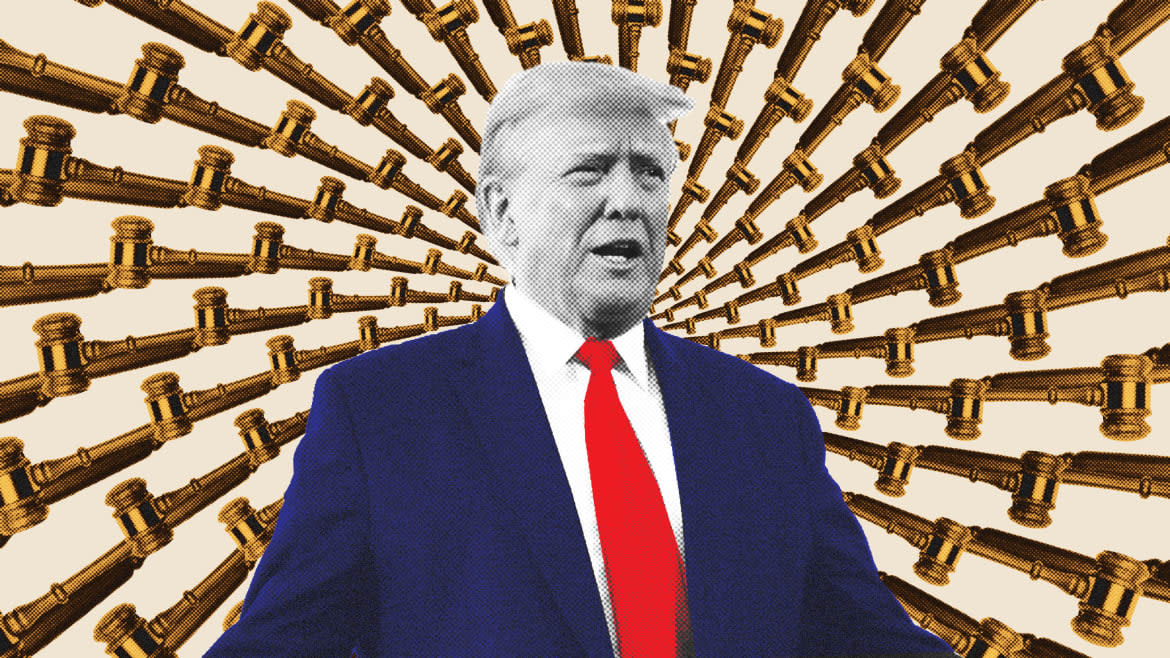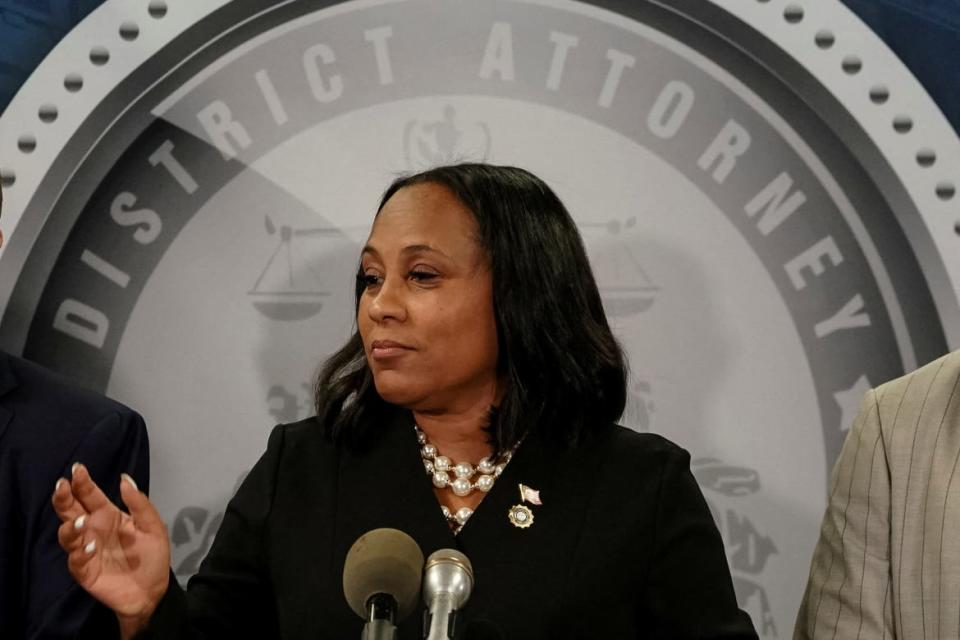Seven of Trump’s Co-Defendants Are Already Rolling the Dice

It’s been a dizzying week in Fulton County Superior Court.
As Donald Trump and his 18 co-defendants in Fulton County District Attorney Fani Willis’ sprawling racketeering case surrendered to jail and negotiated bonds, at least eight of them also filed what became a flurry of legal motions, arguing for their cases to be delayed, moved, or expedited.
But former federal prosecutor Neama Rahmani has some advice for all 18 co-defendants: make a deal—soon.
“Willis doesn’t want to try 19 defendants,” he told The Daily Beast on Friday. “She wants to try Donald Trump, and flip 18 defendants against him.”
During his career as an assistant U.S. attorney, Rahmani, who is now in private practice, put more than 1,000 criminals behind bars, he said. Of those, “I can count on one hand the number of people that I wanted to cooperate, who didn’t cooperate.”
From Trump’s perspective, it’s best if everyone charged alongside him holds the line and forces Willis’ office to take things all the way to trial, Rahmani said. But for the others, the opposite is true. Generally speaking, he said, most criminal defendants play ball with the government because there is “a significant advantage” to doing so.
“And usually, the first to cooperate gets the best deal,” he said.
Cracks developing
The massive case in Fulton County involves countless moving parts, and the situation itself is the first of its kind in American history. At least two defendants threw a wrench into the works this week, with former Trump election lawyers Kenneth Chesebro and Sidney Powell invoking their constitutional right to a speedy trial. (In Georgia, defendants are entitled to a trial starting within two weeks of indictment.)
In response to Chesebro, Willis seems to have called his bluff, according to former federal prosecutor Richard Serafini, who served in the Department of Justice under then-Assistant Attorney General Robert Mueller. She requested, and got, a lightning-fast trial date of Oct. 23 from Judge Scott McAfee, who said he would not do the same for other co-defendants “at this time.”
It appears that Chesebro was counting on forcing the hand of an unprepared Willis, instead finding the DA with a full tank of gas and ready to do battle not only with Chesebro, but all 19 defendants. This, argued Serafini, “was a pretty good indication that the trial prep was, if not done, very, pretty far along.”
For his part, Trump swiftly opposed the motion, suggesting he would move to sever his case from Chesebro if the schedule were moved up so sharply.
Georgia Indictment Throws Everything at Trump—and Some Might Stick
Meanwhile, former Trump chief of staff Mark Meadows and four other defendants—Jeffrey Clark, Shawn Still, Cathy Latham, and David Shafer—filed motions to remove their cases from Fulton County court to Atlanta federal court. Latham, Still, and Shafer said in their motions that they carried out their roles in the alleged plan to subvert the election results at Trump’s direction.
Defense attorney Michel Huff said he believes prosecutors “certainly anticipated” turmoil between the defendants, and will likely seek to use it as an opportunity. Conversely, what is taking place doesn’t necessarily represent turmoil—though, if it does, the effects can cut both ways, according to New York-based litigation attorney Cynthia Augello.
“The defendants here are being charged with conspiracy; it makes sense that they would have separate strategies for defending the claims,” she told The Daily Beast. “The ‘division’ means more work for the prosecution. Rather than proving one case, they have to prepare for and prosecute as many as 19 separate actions as well as fight whatever individual motions are made by each defendant.”
To that end, former Los Angeles County Deputy District Attorney Joshua Ritter sees the legal maneuvering as “more of an attempt to throw the prosecution off balance, than as a sign of infighting between the defendants—not to say that fireworks could not develop further down the road.”
Divide and conquer
If the slate of defendants were to develop significant fissures, defense attorney Peter Pullano, who heads up the criminal practice group at Tully Rinckey PLLC, believes it can only help Team Willis.
“I’ve done trials where I’ll be objecting because we’ve gotten to a point where there are now several ‘prosecutors’ in the room pointing a finger at my client—and by that, what I mean is, the defense attorneys in a case where we’ve all gone to trial together, say, ‘Well, it wasn’t my guy, it was Pullano’s guy,’” Pullano told The Daily Beast. “And so I’ve got to fight off the prosecution, but [also] I’ve got to fight off a co-defendant making allegations.”
Pullano said the typical prosecution strategy “in a multiple co-defendant case, is to divide and conquer.” Right now, every defense lawyer involved in the Fulton County case will have a decision to make, as they review the evidence turned over by Willis’ office, he continued. Prosecutors “like nothing more than to have the actual co-conspirators come in and testify,” Pullano said, noting that these are people who can speak to first-hand knowledge about the alleged conspiracy, which sidesteps hearsay rules.
“Every defendant is there for themselves,” he said. “And whichever way that plays out, it usually benefits the prosecution… It wouldn’t surprise me if everybody in this conspiracy, maybe all the way up to the Number One, will be discussing some sort of plea agreement.”

Fulton County District Attorney Fani Willis.
Dennis Franks, a retired FBI supervisory special agent who worked as a state prosecutor in North Carolina before joining the bureau, said he’s been through enough trials to know that anything is possible. But even though plea deals are the norm, some defendants “will just roll the dice,” he said on Friday. “Maybe there’s one juror that sees their side—that’s all it takes.” (Trump has remained insistent that he did nothing wrong, and has given no indication at all, to this point, that he is inclined to cop any sort of plea.)
It is a “painfully slow process” to try numerous people at once, according to Rahmani, who described the Willis strategy as a “kitchen sink” play, throwing everything she’s got at Trump & Co. to try and force those deals.
A legal gambit
As for the attempts to move the case to federal court, Meadows cited a law allowing federal officers to transfer state prosecutions to federal district court if their alleged illegal actions occurred while they were acting in their official capacity. (Trump is likely to try a similar argument.)
There are legal reasons for the gambit, and a judge will hold a hearing on Monday on Meadows’ motion.
For one, a federal judge could throw out the charges against Meadows if he was acting “under color of” his official position. And, hypothetically speaking, a “less-culpable defendant doesn’t want to be tried with someone who’s more culpable,” Rahmani said.
That is, if Meadows or any of the four others were also able to formally get their cases severed from Trump’s, they would likely avoid being tarred in front of a jury with the same brush as the disgraced ex-president.
“If a lot of [harmful] evidence is going to come out against Trump that may not be relevant to all the other defendants, sometimes certain jurors can’t compartmentalize,” said Rahmani. “If they separate the case, you’re on your own, only the evidence that implicates [that defendant] is going to come in. And it’s certainly a lot less than the evidence against Trump.”
At the same time, Meadows arguing that he was “just following orders” by Trump theoretically runs counter to any defense floated by Trump himself, according to Rahmani.
Trump’s Battle to Move the Atlanta Trial Is Just Beginning
Yet, there’s no clear-cut roadmap for what happens next, especially as Willis is prosecuting the group for conspiracy under Georgia’s Racketeer Influenced Corrupt Organizations (RICO) Act.
In such an instance, the “whole conspiracy” is on trial, according to Pullano, who noted that every defendant, naturally, “is gonna try to distance themselves from the conspiracy.”
“But the conspiracy gets tried as one, and so that’s going to be the counterbalance, the countervailing interest, as a judge makes the decision on this,” Pullano said.
Meadows’ motion to move his proceedings to federal court will serve as a test case, of sorts, for a handful of his co-defendants. It remains to be seen how the broader prosecution will test the limits of the legal system, which has never put a president, former or current, on trial before.
For now, Trump has reverted to usual form. On Thursday, he became the first-ever past or sitting president to have his mugshot taken by police. T-shirts bearing the defendant’s historic snap are now available, via the Trump campaign, for $34 each.
Get the Daily Beast's biggest scoops and scandals delivered right to your inbox. Sign up now.
Stay informed and gain unlimited access to the Daily Beast's unmatched reporting. Subscribe now.


